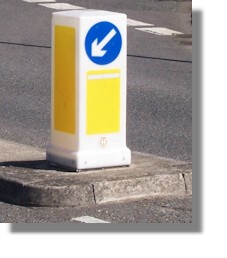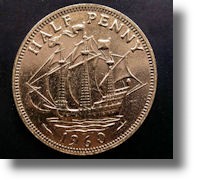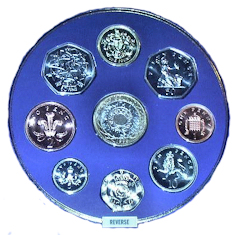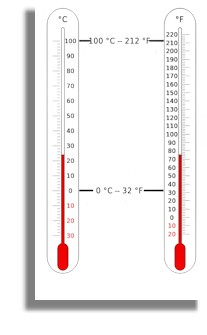

Over the Pond
By Frank Hatton
This is one of a large number of Scottish related articles by Guest Writers which have been added to Rampant Scotland. The pages were previously part of the "Scottish Radiance" Web site and there are many more articles in this series being added over a period of months.
Changing from "Shillings and Pence" to Decimal Currency
I suppose it is inevitable when changes occur, that there is a period of suffering or inconvenience while adjustment takes place. For instance, if for some reason, we were suddenly forced to drive on the opposite side of the road to the side to which we are accustomed, there would inevitably follow a period when we would be crashing into each other's cars, until we had settled into the new system. Likewise, imagine the complete failure of electricity as a power supply, and we had to learn to run our lives without it. No lights, telephones television, freezers, vacuum cleaners, aeroplanes, cars, etc. etc. Provided we did not die from withdrawal symptoms, we would eventually adjust.
I give these "minor" examples to show how ones life can be really and quite seriously disrupted, when the very fabric of our existence is disturbed. Being one of life's 'wrinklies', I have been involved in several earth shattering changes to my lifestyle, to which I have been forced to adapt. The first of these, was the decimilisation of our currency! Now, while it is accepted that our old system of British pounds, shillings, and pence was a trifle difficult to understand, particularly when the usage of halfpennies, and farthings (coins with a value of half or a quarter of a penny, which in turn was 1/240th of a pound..) were also included in the calculations. There was however, quite often a degree of entertainment to be had. I refer to our friends from overseas, who, being used to Dollars and cents, Marks and fennigs, Francs and centimes, etc. were faced with the need to understand what was meant, when asked for payment of a purchase, and the sum involved was , say, three pounds, fourteen shillings, and fivepence three farthings, (£3. 14. 5.75).
The consternation on their faces, while they tried to mentally convert this figure to the standard currency of their homeland, and make some sense of the value, was in the realms of vaudeville at it's best. To us natives, it was second nature to accept four farthings to the penny, or two farthings to the halfpenny, twelve pennies to the shilling, two hundred and forty pennies, or twenty shillings to the pound. Plus of course, we had the several other coins, like the threepenny piece, the sixpence, the shilling (12 pence), the Florin (24 pence), the half crown (30 pence), and of course the old ten bob note (ten shillings). For the life of us, we could not understand how anyone could fail to grasp these very simple principles of the British currency.
Imagine then, if you will, what a traumatic experience it was, when in 1971, some idiot decided to convert the whole of our money over to the decimal system. At one fell swoop, we were faced with coins to the value of, half new pence, (now defunct), one new pence, two new pence, five new pence, ten new pence, twenty new pence, fifty new pence, and eventually, a one pound coin equalling 100 new pence.How on earth did the authorities expect us to adjust to prices of say, £1.25, £2.78, or even worse, 18 new pence, etc. etc. It was a nightmare !!! For years after the changeover, I was still asking shopkeepers, how much their demands were in 'real money'. Ultimately of course, albeit that our brains were permanently scarred by this monstrous indignity of getting in line with the rest of the world, we have come to accept our new money system.
You will remember that film called "Jaws", which used as part of it's advertising campaign, the expression, "Just when you thought it was safe to go back into the water"? We have been hit with the equivalent of Jaws1, Jaws2, Jaws3, and goodness knows how many more shocks we have to come. With the brain still staggering from the effects of what I am about to describe, you will forgive me if the chronological order of events is not strictly accurate.
Having spent the whole period since the invention of the internal combustion engine, paying for our petrol supplies by the gallon, we were then faced, in addition to the change of currency to pay for it by the Litre ! The 'knock on' effects of this were enormous. First, how were we going to work out how many miles to the gallon our car was doing? The whole of our motoring economy structure was ruined. We just did not know what a journey would cost us, unless one was au fait with the complications of a calculator.The authorities told us it was easy to convert costs! All we had to do, was remember that there were 4.546 litres to the gallon, so whatever the cost of a litre, why, simply multiply that figure by 4.546. Easy isn't it! Especially when we are charged say, 69.9 pence per litre. Y'know, you leap back into your car after filling up with petrol, and provided you have a journey of some two hundred and fifty miles in front of you,-- by the time you get to your destination, you should have it all worked out how much you are paying per gallon, to the nearest penny.
Heaven forbid that you should have to put air into your tyres. That old way of putting in so many pounds pressure to the square inch -- absolute rubbish! The pressure gauge is now calibrated in either kg/sq. cm. or you could be lucky and get it marked in Bars. Whatever, it's probably easier to wait until the tyre at the base of the wheel looks a bit flat, then put in the air until it is no longer flat!
Told you there were other "Jaws" didn't I. What about the supermarket? What do you want? Couple of pounds of fillet steak? So, you look at the label on the pack, it is marked 1.658 kgs ! The price? £16.84 per kg. Is it going to be enough for the family? Is it cheap or expensive? It's a little like going to Las Vegas regarding whether you win or lose on the deal.
We used to have a very familiar Fahrenheit temperature measuring system ! If the temperature was anywhere around the 32 to 45 degree mark, you needed an overcoat to go out, around 50 to 60 degrees you could just wear a jacket. 65 upwards, and shirtsleeves would do. Now, we've got what we used to call Centigrade, but they now insist on calling it Celsius. That starts at 0 degrees for freezing, but once we get above that, I am at a loss as to whether I should wear an overcoat, a swimsuit, a sunshade, or ice-skates! Hey, and what about our measurements? Want to buy a length of wood? What do you want? Er, yes please, I want 48 inches long by 6 inches wide by half an inch thick. Ho, Ho, Ho, Sir, we don't work in those old Imperial units anymore. We got metres, centimetres, millimetres. Now Sir, there's 2.54 cms, or 25.4 mms to the inch, and you got 39.37 inches to the metre. You just go over there in the corner, and work out what you want in these 'ere metric units, and I'll get you sorted out in no time at all.My friend, don't think for an instant that there is no more. There is plenty more, but in fairness to you, I feel the point has been proven. Me, and thousands, (maybe millions) like me have been caught in the transition zone. The kids growing up today, are assimilating these new units with ease. They don't know, and they don't want to know about our old money, our old measurements. They automatically think in, and use metric, and of course, it all makes a lot of sense in working towards a universal system.
As I said earlier, a period of suffering and inconvenience is inevitable in any major changeover. Believe me when I say, it is mentally, extremely painful. O.K., time to lighten the mood and talk of happier things. Isn't it strange how children always seem to be able to ignore the complexities of life, and get right down to the 'nitty gritty'. I was told about this little kid, who was frowning with concentration, and scribbling on a piece of paper. His dad asked what he was drawing. "I'm drawing a picture of God" he said. "But nobody knows what God looks like" said dad. "They will when I've finished this drawing" little one replied.
The other child was slightly older. About eight years of age, and writing furiously in his notebook. "What are you writing about" said dad "I'm writing an essay on the history of the world." "Goodness, that's very ambitious." "Not really, three of us in my class are working on it."
It does seem such a shame, that all of this clarity of vision, and uncomplicated lifestyle that we have as children, gradually disappears as one gets older. Fortunately, the transition is not one that occurs overnight, which in itself is one almighty blessing. Otherwise, just think of the trauma of going to bed one evening with this wonderful simplistic understanding of what life and the complexities of the world are all about, and know with certainty exactly how you will deal with them.
Then, horror of horrors, you wake up in the morning with a thought pattern somewhat similar to a mixture of treacle and old chewing gum. No, thank goodness, the changeover from childhood clarity of vision, to the adulthood nightmare is slow enough as to be accepted without being noticed.
It is only when we are faced with modern complexities like computers, and the maze of other technical advances, and we attempt to bring the awesome power of our full mental capabilities into play in solving how they work. ----- We suddenly become aware of some small child, who has spent just a few minutes contemplating the controls of the thing, and has it up and running, as though it were the most natural thing in the world to do so. It is all very disconcerting to someone who has only just about mastered the way to set up the video to record a programme, and even then, would take no bets that it has been done correctly.
I recall a piece of advice on the ability of children. If you have a jar with a lid that is immovably stuck, what you do, is put it on the table, and tell the kids not to touch it!
Editor's Note: Elsewhere on Rampant Scotland there is an article (with illustrations) describing all the pre-decimal UK coins and the preparations made by banks, commerce and industry to smoothly implement decimal currency. See Did You Know? - - Pre-Decimal Coins .
Return to Index of Over the Pond by Frank Hatton or Index of All Guest Writers








